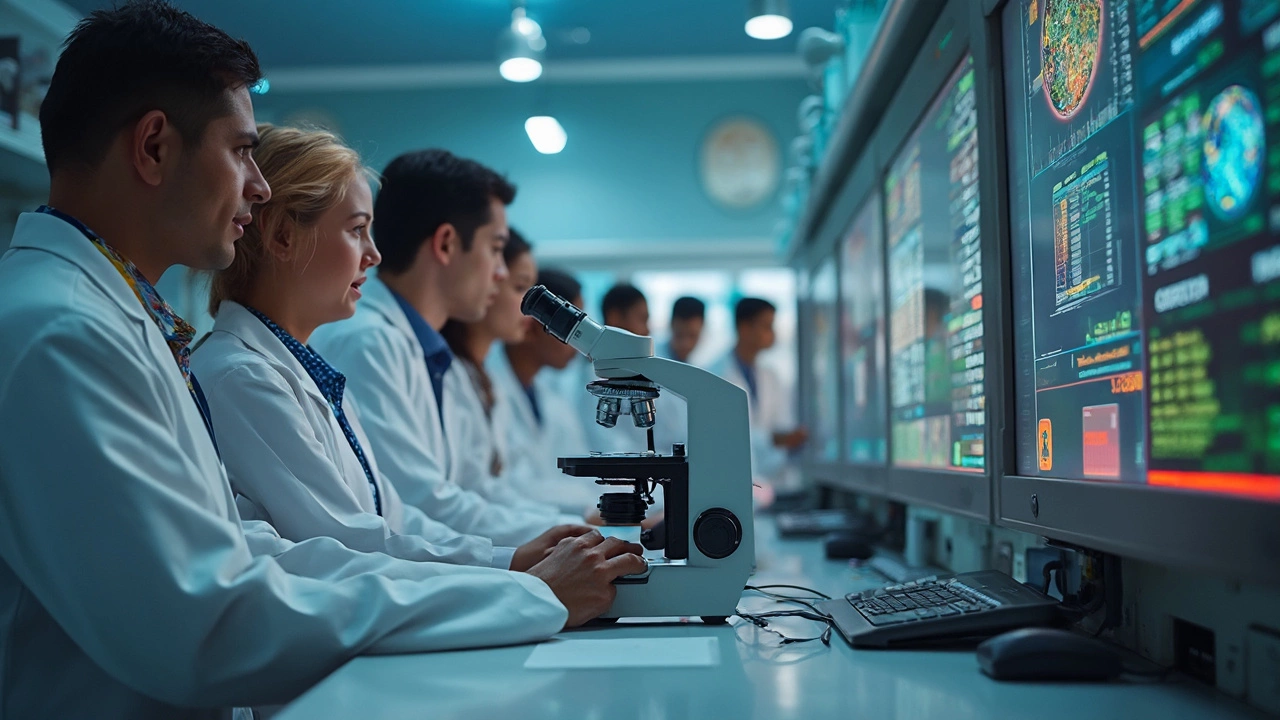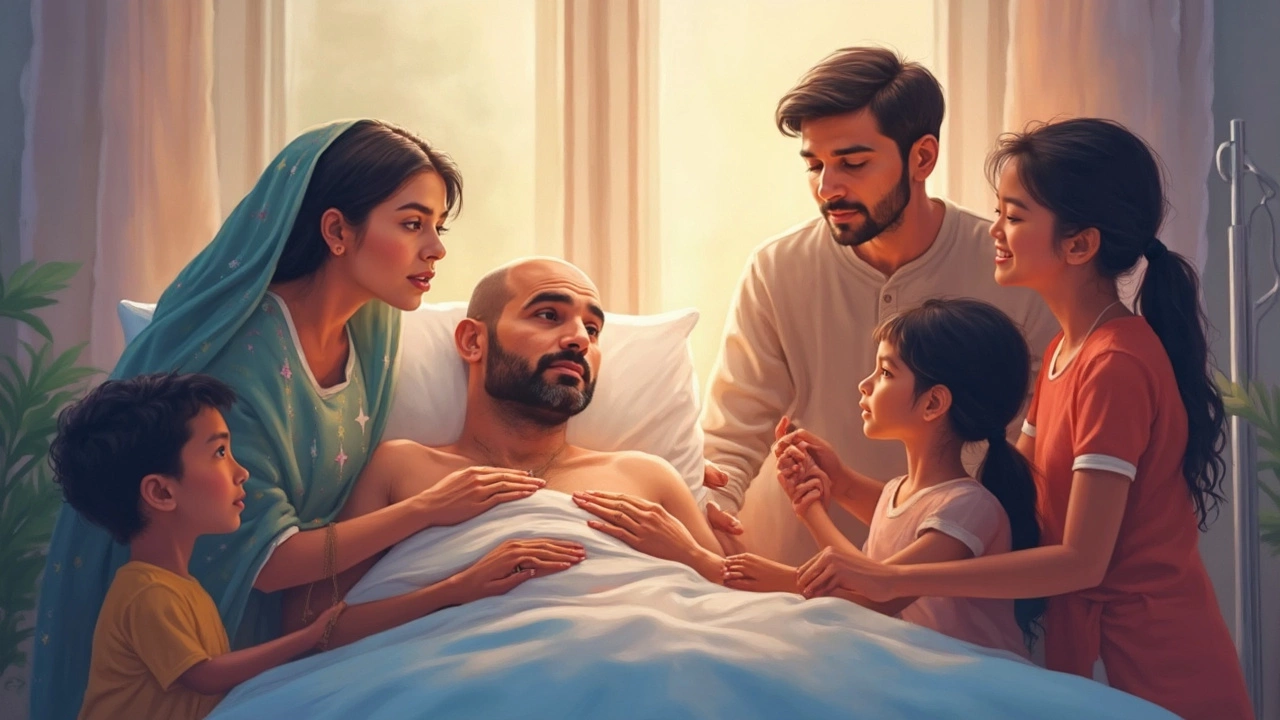Cancer Treatment: What's the Main Method?
 Mar, 30 2025
Mar, 30 2025
Cancer's a beast, right? If you're reading this, chances are you're looking for answers about how people fight back against it. The main player in cancer treatment land? Good ol' chemotherapy. Yep, it's probably the one you've heard about the most.
So, what's it all about? Chemotherapy's like this powerful mix of drugs targeted to wipe out those pesky cancer cells. The idea is simple: hit the fast-dividing cells and stop them from doing their thing. It's been around for decades, constantly getting refined to be more effective.
But, it's not just about zapping cancer cells. Chemo can be kinda rough, with side effects like fatigue, nausea, and hair loss. While it sounds tough, knowing what to expect can help you navigate the journey more smoothly. And these days, doctors are pretty good at keeping those side effects in check, which makes the whole experience a tad easier.
- Understanding Chemotherapy
- How Chemotherapy Works
- Side Effects and Management
- Alternative Treatments
- Making Informed Choices
Understanding Chemotherapy
Alright, let's break down this beast called chemotherapy. It's probably the star of the show when it comes to cancer treatment. Everyone's heard about it, but what's really going on? Basically, it's the use of drugs to destroy cancer cells. The thing about cancer cells is they divide and grow like someone's life depends on it—except, it's your life they're messing with.
Here's the strategy: while it targets cancer cells that divide fast, it can also hit some of the body's healthy fast-growing cells, like ones in your hair. That's why you see hair loss as a common side effect. But don't worry, hair grows back, and by managing side effects, you can still lead a pretty normal life during treatment.
Some facts: Chemotherapy can be used in different ways - as a main treatment or alongside surgery or radiation. It can shrink tumors before surgery, kill leftover cancer cells afterward, or help other treatments work better. It depends on the cancer type and its stage. Docs really tailor this to each person's needs.
| Goal | Purpose |
|---|---|
| Cure | Complete eradication of cancer |
| Control | Shrink tumors and stop spreading |
| Palliation | Relieve symptoms and improve quality of life |
Today, with advancements in medicine, cancer therapy is way more effective and sophisticated than before. There's ongoing research to make these treatments even kinder to your body while still kicking cancer's butt. So if you're facing chemo, know that you're not alone and there are loads of resources and support systems out there to help you through it.
How Chemotherapy Works
So, you're curious about how chemotherapy actually gets to work? It's not magic, but it’s got some clever science behind it. The key thing with chemo is its ability to target those fast-growing cancer cells. Basically, cancer cells divide really quickly and that's sorta their downfall—chemo drugs zoom in on these speedy cells and slow them down or stop them in their tracks.
This treatment isn't one-size-fits-all. You’ve got a whole mix of drugs available, and doctors pick them based on the type of cancer, how fast it’s growing, and whether it has spread to other parts of the body. Some drugs mess with the DNA inside cancer cells, while others prevent cells from dividing.
“Chemotherapy targets specific cellular functions, essentially disrupting the enemy's base of operations,” says Dr. Angela Green, a leading oncologist.
But wait, here's where it gets interesting, right? Chemo doesn’t just go for cancer cells; it can hit healthy cells too—especially those that also multiply quickly like hair follicles, which is why people often lose their hair. Blood cells, which divide often, can also take a hit, leading to that infamous fatigue and risk of infections.
Here's a cool fact for you: not all patients feel the side effects the same way. Doctors are always tweaking stuff to balance killing cancer cells while saving the healthy ones. It’s a dance of sorts, finding the right combo and dosage, and that’s where the magic of modern medicine really shines.

Side Effects and Management
So, let's chat about something that isn't exactly the fun part of cancer treatment—the side effects of chemotherapy. These drugs are powerful, but they don't just target cancer cells. They can affect other fast-dividing cells in your body too, which is why side effects pop up.
Common ones you might hear about include nausea, hair loss, fatigue, and some changes in appetite. And here's the thing, everyone reacts differently, so it's kinda like a surprise box—you never know what you're gonna get. But don't worry, there are ways to handle these.
"Managing side effects is crucial for the overall well-being of the patient," says Dr. Susan Cassidy, an oncologist. "We aim to not just prolong life but ensure its quality as much as we can."
Let’s break it down a little. For nausea, doctors often prescribe anti-nausea meds to keep it in check. Feeling wiped out? Rest is super important—don't be a hero and push yourself too hard. Your body’s doing some heavy lifting here.
- Nausea and Vomiting: Anti-nausea medications, like ondansetron, can help manage these feelings effectively.
- Fatigue: Balancing activity and rest, along with staying hydrated and maintaining a healthy diet, can make a big difference.
- Hair Loss: Some people prefer wigs or hats. It’s more about what's comfortable for you.
- Appetite Changes: Eating small, frequent meals and trying different flavors might help stimulate your appetite.
But here's a cool tidbit—cancer treatment side effect management is always improving. Thanks to ongoing research, there are new meds and strategies all the time. So don't hesitate to chat with your healthcare team about tweaking your treatment plan to suit your needs. Knowledge is definitely power here. You’ve got this!
Alternative Treatments
While chemotherapy takes center stage in the fight against cancer, there's a growing interest in other strategies that might lend a hand or offer relief. Let's dive into some popular alternative treatments out there. Remember, it's always best to chat with your doc before trying anything new.
One option folks are talking about is integrative medicine. This approach combines the best of conventional cancer therapy and complementary techniques like acupuncture, massage, and meditation. These aren't standalone cures, but they can help with managing pain and improving mood.
Another buzzworthy talk of the town is immunotherapy. It's all about boosting the body’s own immune system to fight cancer. These treatments are gaining steam, especially for certain types of cancer, but they come with their own set of challenges and aren't applicable to everyone.
Dr. Lisa Miller, an oncologist, said, "Integrative approaches, when used alongside standard treatments, can aid in symptom management and improve quality of life."
Cancer treatment options also include targeted therapies. These are designed to zoom in on specific cancer cells, sparing more of the healthy cells compared to traditional treatments. Think of it like a sniper rifle, as opposed to the shotgun approach of chemo.
And hey, let's not forget about the power of diet and exercise. Some studies suggest that a balanced diet rich in veggies and lean proteins, along with regular physical activity, might improve treatment outcomes and reduce the risk of recurrence.
- Acupuncture: Helps relieve nausea and pain.
- Meditation: Aids in reducing stress and improving emotional health.
- Herbal Supplements: Always consult your oncologist before trying these.
- Yoga: Enhances physical strength and mental peace.
Keep in mind, though. Alternative treatments should complement, not replace, traditional methods. So, if you or a loved one is considering broadening your treatment plan, a discussion with a healthcare provider will steer you in the right direction.

Making Informed Choices
Facing cancer is tough, no doubt. But having the right info can make the journey a bit clearer. When it comes to cancer treatment, choosing the right path isn't easy. There's no one-size-fits-all, and that means understanding what's available and how it affects you is key.
First thing to remember: each cancer therapy is unique to the type and stage of cancer you’re dealing with. It's not like picking out a new pair of shoes. It involves a lot of careful thought and expert advice.
"Cancer treatment decisions should be based on the best evidence available and personalized to the patient's circumstances," says Dr. Sandra Lee, a renowned oncologist.
Your doctor might talk about surgery, radiation, or the biggie, chemotherapy. Sometimes, you'll get a combo. These treatments are like a team tackling the problem from different angles. So how do you decide?
- Don’t rush your decision. Take the time to ask all your questions.
- Consider getting a second opinion. It never hurts to have another expert weighing in.
- Think about the logistics: can you manage the side effects? What about your daily life needs?
- Look into financial support. Cancer treatments can be costly, so know your options.
And let's talk about having a good support squad. Family, friends, and cancer support groups can be super helpful. They provide emotional support and practical help—both of which are super important during treatment.
Having access to accurate and specific info makes all the difference when deciding on cancer treatment options. So, don't hesitate to reach out to healthcare professionals, use reputable online resources, and lean on your personal support network.
Your journey is personal, and staying informed helps you and your loved ones navigate the road ahead with confidence. Remember, you're not alone in this.